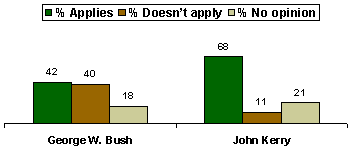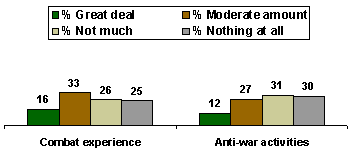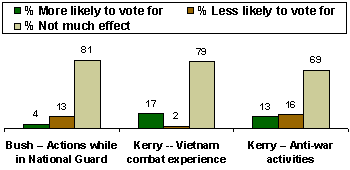GALLUP NEWS SERVICE
PRINCETON, NJ -- Questions about President George W. Bush's service in the National Guard have dogged the White House for the past few weeks. The Bush administration recently released Bush's military records, but so far, that hasn't ended the controversy. A new CNN/USA Today/Gallup poll shows Americans are more likely than not to give Bush the benefit of the doubt as to whether he did something wrong and whether he is hiding something in this matter. Still, the public is divided over whether Bush "did his duty for the country during the Vietnam War." The poll shows that most Americans say that presidential candidates' military service -- including the specifics of Bush's and Massachusetts Sen. John Kerry's -- will not affect their votes this November.
The poll, conducted Feb. 16-17, shows the public is not largely tuned in to the debate over Bush's National Guard service. Slightly more than half of Americans say they have heard or read a great deal (23%) or a moderate amount (34%) about the controversy, leaving 43% who have not heard much (29%) or anything at all (14%) about it.
When asked for their views on Bush's actions in the matter, Americans tend to give Bush the benefit of the doubt. About half of Americans, 49%, say he did not do anything seriously wrong. Thirty-one percent say he did something unethical, but not illegal, and only 4% say he did something illegal. A majority, 54%, disagrees with the notion that Bush is hiding something regarding his National Guard service, while 36% believe that there is more to the story than Bush has revealed.
Among those who have heard or read a great deal about Bush's National Guard service, 56% say he did nothing seriously wrong, 33% say he did something unethical, and 8% say he did something illegal.
Still, there are lingering doubts about Bush's military service more generally. The public is divided as to whether the characteristic or quality, "did his duty for the country during the Vietnam War," applies to Bush: 42% say the statement applies to Bush and 40% say the statement does not apply to him (18% have no opinion). In contrast, 68% say that characteristic or quality applies to Kerry, with 11% saying it does not and 21% not expressing an opinion.
| Did Their Duty for the Country During the Vietnam War? |
 |
| Feb. 16-17, 2004 |
Kerry's wartime activities are unknown to many Americans -- less than half (49%) have heard a great deal or moderate amount about his combat experience in Vietnam. Even fewer, 39%, have heard much about Kerry's anti-war activities after he returned from Vietnam.
| Knowledge of Kerry's Wartime Activities |
 |
| Feb. 16-17, 2004 |
What Effect on the Vote?
At a very general level, most Americans, 60%, say a candidate's military experience makes no difference to their vote, but it is more likely seen as a plus (38% say it makes them more likely to vote for a candidate) than a minus (only 1% say it makes them less likely to do so).
In terms of the specific Bush case, the vast majority of registered voters, 81%, say that his actions while in the National Guard will not have much effect on their votes. However, his actions are more likely to have a negative than a positive effect, as 13% say the actions make them less likely to vote for Bush, and 4% say they make them more likely.
Similarly, Americans view Kerry's efforts in Vietnam -- he was a Navy lieutenant and served in combat, which led to his receiving the Silver Star, three Purple Heart medals, and several others -- as not likely to influence their votes. About 8 in 10 registered voters say Kerry's combat experience will have no effect on their votes, but 17% of registered voters say it makes them more likely to vote for him, while 2% say less likely.
A majority of registered voters, 69%, also say Kerry's anti-war activities will not influence their votes in November, though more people say it will have an effect than say this about his combat experience. The net effects of Kerry's anti-war activities could be mixed, as 16% of registered voters say his activities make them less likely to support him for president, but 13% say they make them more likely to do so.
| Effect of Wartime Activities on
Vote Among Registered Voters |
 |
| Feb. 16-17, 2004 |
These results should be viewed cautiously, however. Most of the registered voters who say Bush's National Guard service will influence them to vote against him, or who say Kerry's combat experience will make them more likely to vote for him, are Democrats or Democratic leaners. Similarly, most of the voters who say Kerry's anti-war activities will cause them to vote against him are Republicans or Republican leaners. Thus, the information is more likely to reinforce voters' initial predispositions than to cause them to vote for a candidate they otherwise would not have.
The assessments of those who are familiar with Bush's and Kerry's military service are no different from the general public's assessments of the effect it will have on their votes. However, the data suggest that those who are familiar with Kerry's anti-war activities are more likely to indicate that this information could sway their votes, although these voters break about equally for and against Kerry on this score. Forty-four percent of registered voters familiar with Kerry's anti-war activities say this could affect their votes, with 24% saying it makes them less likely to vote for him, and 20% saying more likely. Among registered voters who are unfamiliar with Kerry's anti-war activities, only 18% say this information could affect their votes.
The poll also finds military veterans are more likely than non-veterans to have heard about Bush's and Kerry's Vietnam War-era activities, but are only slightly more likely than non-veterans to say this will affect their votes.
Survey Methods
These results are based on telephone interviews with a randomly selected national sample of 1,006 adults, aged 18 and older, conducted Feb. 16-17, 2004. For results based on this sample, one can say with 95% confidence that the maximum error attributable to sampling and other random effects is ±3 percentage points. In addition to sampling error, question wording and practical difficulties in conducting surveys can introduce error or bias into the findings of public opinion polls.
8. Thinking about the following characteristics and qualities, please say whether you think it applies or doesn't apply to George W. Bush. How about – [ROTATED]?
C. Did his duty for the country during the Vietnam War
|
Applies |
Doesn't apply |
No opinion |
|
|
2004 Feb 16-17 |
42% |
40 |
18 |
9. Thinking about the following characteristics and qualities, please say whether you think each applies or doesn't apply to John Kerry. How about – [ROTATED]?
C. Did his duty for the country during the Vietnam War
|
Applies |
Doesn't apply |
No opinion |
|
|
2004 Feb 16-17 |
68% |
11 |
21 |
11. A president can come from many different types of backgrounds. Please tell me how important military service is. Would you be more likely or less likely to vote for someone with military service or wouldn't it make a difference to you?
|
More likely |
Less likely |
No |
No opinion |
|
|
2004 Feb 16-17 |
38% |
1 |
60 |
1 |
12. Are you more likely to vote for someone for president with combat experience, someone who served without combat experience, or wouldn't it make a difference?
|
With combat |
Without combat |
Makes no |
No |
|
|
2004 Feb 16-17 |
21% |
1 |
77 |
1 |
Now, thinking for a moment about something else,
13. How much have you heard or read about George W. Bush's service in the National Guard during the Vietnam War—a great deal, a moderate amount, not much, or nothing at all?
|
Great |
Moder- |
Not |
Nothing |
No |
|
|
2004 Feb 16-17 |
23% |
34 |
29 |
14 |
* |
14. From what you have heard or read about George W. Bush's service in the National Guard, which of the following statements best describes your view of his actions in this matter – [ROTATED: he did something illegal, he did something unethical but nothing illegal, or he did not do anything seriously wrong]?
|
|
|
Nothing |
|
|
|
|
2004 Feb 16-17 |
4% |
31 |
49 |
1 |
15 |
15. In your view, is George W. Bush hiding something concerning his service in the National Guard, or don't you think so?
|
Yes, hiding |
|
No |
|
|
2004 Feb 16-17 |
36% |
54 |
10 |
17. Do George W. Bush's actions while in the National Guard make you more likely or less likely to vote for him--or will they not have much effect on your vote?
|
More |
Less |
Not much |
No |
|
|
% |
% |
% |
% |
|
|
Likely Voters |
||||
|
2004 Feb 16-17 |
4 |
15 |
80 |
1 |
|
Registered Voters |
||||
|
2004 Feb 16-17 |
4 |
13 |
81 |
2 |
|
National Adults |
||||
|
2004 Feb 16-17 |
3 |
13 |
81 |
3 |
On a different topic,
18. How much have you heard or read about John Kerry's combat experience during the Vietnam War—a great deal, a moderate amount, not much, or nothing at all?
|
Great |
Moder- |
Not |
Nothing |
No |
|
|
2004 Feb 16-17 |
16% |
33 |
26 |
25 |
* |
19. How much have you heard or read about John Kerry's anti-war activities after he returned from serving in the Vietnam War—a great deal, a moderate amount, not much, or nothing at all?
|
Great |
Moder- |
Not |
Nothing |
No |
|
|
2004 Feb 16-17 |
12% |
27 |
31 |
30 |
* |
Q.22-23 ROTATED
22. Does John Kerry's combat experience in the Vietnam War make you more likely or less likely to vote for him--or will it not have much effect on your vote?
|
More |
Less |
Not much |
No |
|
|
% |
% |
% |
% |
|
|
Likely Voters |
||||
|
2004 Feb 16-17 |
19 |
2 |
78 |
1 |
|
Registered Voters |
||||
|
2004 Feb 16-17 |
17 |
2 |
79 |
2 |
|
National Adults |
||||
|
2004 Feb 16-17 |
17 |
2 |
79 |
2 |
23. Do John Kerry's anti-war activities after he returned from serving in the Vietnam War make you more likely or less likely to vote for him--or will they not have much effect on your vote?
|
More |
Less |
Not much |
No |
|
|
% |
% |
% |
% |
|
|
Likely Voters |
||||
|
2004 Feb 16-17 |
16 |
18 |
65 |
1 |
|
Registered Voters |
||||
|
2004 Feb 16-17 |
13 |
16 |
69 |
2 |
|
National Adults |
||||
|
2004 Feb 16-17 |
13 |
16 |
69 |
2 |
